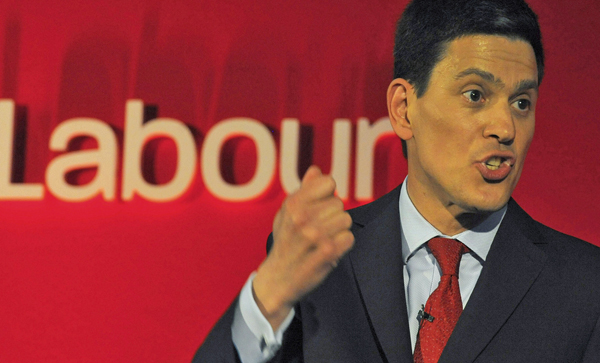When was the last time the contest to lead a major political party (or build a city) ended in a virtual tie between two brothers – since Romulus and Remus that is? Well, okay, maybe in a Shakespearean tragedy or two, in a Biblical tale, or in some of the struggles between the classical Antonine emperors or between those feisty Carolingian siblings after Charlemagne; but one really has to look pretty hard in the modern era for a parallel to what has happened between Ed and David Miliband in Manchester over the weekend.
On the eve of the Labour Party’s annual autumn conference, Edward and David Miliband pushed aside three other claimants – Ed Balls, Andy Burnham and Diane Abbott – until there were only the two Milibands left. Ed Miliband had previously served as energy secretary and David had been the foreign secretary in the last Labour government. But in the final vote, younger brother Ed beat his older brother David by a razor-thin margin of 50.65% to 49.35% of the votes by Labour MPs and other elected officials, party members and members of associated unions.
Ed Miliband ultimately gained his margin of victory from strong support from labour union voters as he adroitly positioned himself just to the left of his brother. In a way, it was the replay of the contest between the old-style Labour Party and Gordon Brown’s ideological legacy versus Tony Blair’s New Labour formulation – with just a glance leftward to the winning position. In successfully campaigning to win the top party job, Ed portrayed himself as the real “change” candidate (now, where have we heard that before?) without alienating the party's mainstream. In the process, he also gained the backing of three of Britain's four biggest trade unions - GMB, Unison and Unite. Summing up labour union support, “He understands the Labour Party needs to change and he is the best candidate to reconnect Labour with the concerns of ordinary working people,” Derek Simpson and Tony Woodley, Unite's joint general secretaries, had written of him for a widely distributed pamphlet.

Photo: The loser, British MP and former foreign secretary David Miliband. REUTERS/Nigel Roddis
Earlier on, the odds makers and party insiders had thought David Miliband was the favoured son, before support finally shifted to his brother in the last few weeks. David had been thought to be the favourite by virtue of his age and greater experience, his closeness to Blair and his status as the party’s leader-in-waiting, having nearly challenged Gordon Brown for the pole position several times already. Now British observers are saying that while David has agreed to serve in his brother’s shadow cabinet, he may well move off to another arena in the longer term.
Now, no one is saying Ed Miliband is actually going to take Labour back to the political wilderness of its hard-line ideological stance of 1979 that was so resoundingly beaten by Margaret Thatcher. As a result, his victory may well put pressure on the Con-Dem coalition in highlighting the ideological differences between the ruling coalition and Labour – and thereby increase the pressures on the Liberal-Democratic part of that coalition to weaken in its ardour for governing with the Tories. In fact, in the most recent polls, Labour has nearly pulled even with the Tories in popular favour and the Lib-Dems have already lost at least half their support as measured just before the election. It is not a huge stretch to see Labour seriously courting many Lib-Dem supporters, especially as the governing coalition begins to carry out its planned spending cuts and the real belt-tightening of the social welfare cocoon.
Nevertheless, in response to charges that his appeal to the left has simply been designed to tell Labour activists want they want to hear, he recently told a Westminster press lunch that “we cannot define ourselves in opposition to our party” and that the “centre ground should be shaped from the left”. Miliband has already used his victory speech to promise a renewed focus on traditional Labour priorities—and most especially the still considerable gap between rich and poor.
He is now scheduled to give his first substantive speech on the last day of conference as party leader, and then to pick his shadow cabinet in early October after the party gives him a roster of 20 people to choose from for the various positions. Then, on October 20, after the coalition government issues its comprehensive spending review, Miliband will have a chance to attempt to frame the debate his way on the biggest issue for the country—the government’s enormous fiscal deficit—for the full run of the new parliament.
But perhaps the most interesting part of the new Miliband era is the back-story of Ed and David’s family history. The two politicians are the sons of one of Britain’s leading Marxist political theorists – the late Ralph Miliband – a man who had escaped from the Nazis by boat from Belgium in 1940. Their mother Marion Kozak is an activist who has worked with such organisations as “Jews for Social Justice for Palestinians”. Ralph Miliband, in turn, was the son of a Polish Jew who had made his living as a skilled leather worker after moving to Belgium from Poland, well before coming to the UK.
Watch: ITN News report on Miliband's appeal.
People who knew Ralph Miliband have commented to the British press that if he were alive today, he probably would have had trouble voting for either of his sons - so far have they now moved from their father’s classic, rock-solid Marxism. In fact, by the time of his death in 1994, Miliband senior is said to have despaired that real socialism could ever be achieved through Britain’s parliamentary system. He was buried next to his idol Karl Marx.
The two brothers were asked during a televised debate before the vote whether they thought they were actually socialists. They both said “yes”, but neither probably would be defined as one by the measuring rods their father had used in his writing. According to their public statements, both brothers have accepted the existence of the capitalist system as an established fact, choosing to interpret socialism as a mission to combat its injustices and protect its potential victims, rather than a new political and economic system.
But as influential as their father was on their thinking, Oxford University politics fellow Marc Stears insists Ed’s mother was the key influence. Stears says, “There's no doubt that Ed got a lot of his drive from Marion and a lot of his feel for nitty-gritty grassroots politics from Marion too.”
Growing up, the Miliband sons met the full range of the socialist elite as dinner guests in their Primrose Hill home, including the likes of Ken Livingstone, Tariq Ali and Tony Benn. Both sons went to Oxford after attending a regular North London comprehensive and they even took the same course – politics, philosophy and economics – albeit several years apart. Ed Miliband once described his favourite month at Oxford as the time he was involved in a rent dispute with his college, Corpus Christi. “Politics always motivated me more than academia,” he said afterwards.
Both brothers then became political activists early in life. After briefly working as a television journalist, Ed became a speechwriter and researcher for the woman who is now the deputy Labour leader, Harriet Harman, when she was a shadow minister during Tories' rule. But Ed Miliband’s number-crunching skills brought him to the attention of then-shadow chancellor Gordon Brown, who spirited him away from Harman’s staff to work for him instead.
Along the way, Ed earned a reputation as something of a diplomat among the party factions. His skill at defusing rows was reportedly much in demand in the early days of the already-escalating battle between Brownites and Blairites. Ed was the man sent from the Brown camp to make peace with prime minister Blair’s staff at 10 Downing St, where his brother David was serving as head of Blair's policy unit.
Just prior to becoming an MP, Ed Miliband spent a year's sabbatical at Harvard University’s Centre for European Studies. Both brothers essentially came of age politically in a Labour Party-dominated landscape – something that has now clearly changed with the rise of an equally young set of leaders in the Tory and Liberal-Democratic Parties - David Cameron and Nick Clegg.
Ed Miliband now lives in his childhood neighbourhood of Primrose Hill, with his partner, Justine Thornton and their young son - with another son on the way. He used to introduce himself to people as “the other Miliband”, something his elder brother may have to use now instead. Ed has said of himself “I am not the candidate for the easy life.” Now he will have to live that very existence. DM
For more, read The Economist, BBC, The Guardian, and The Telegraph. And on Ralph Miliband, read Independent.
Main photo: Former cabinet member Ed Miliband (R) embraces his brother David after being named as the new leader of Britain's Labour Party during their annual conference in Manchester, northern England, September 25, 2010. Britain's opposition Labour Party chose former Energy Secretary Ed Miliband as its new leader on Saturday after a cliffhanger vote, the party said. REUTERS/Darren Staples





